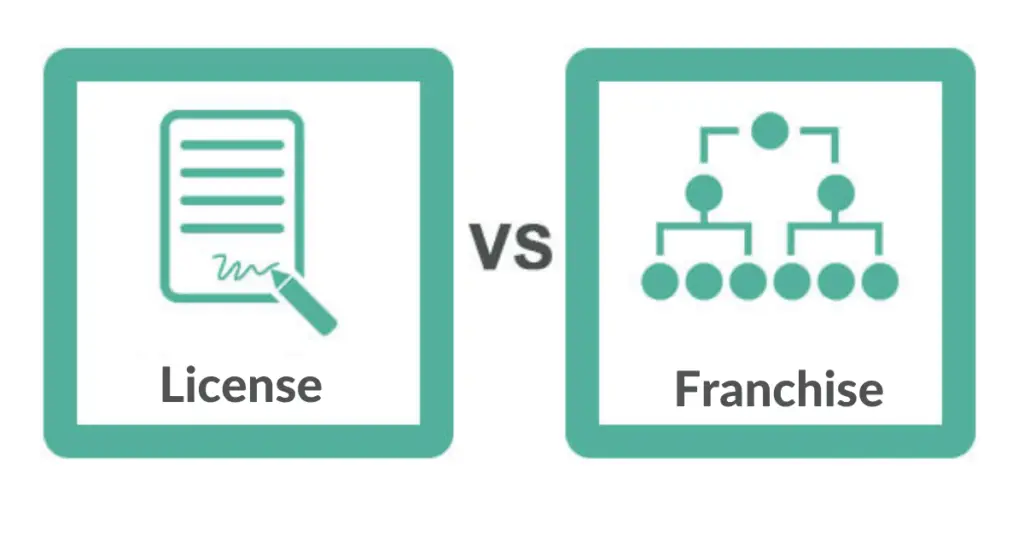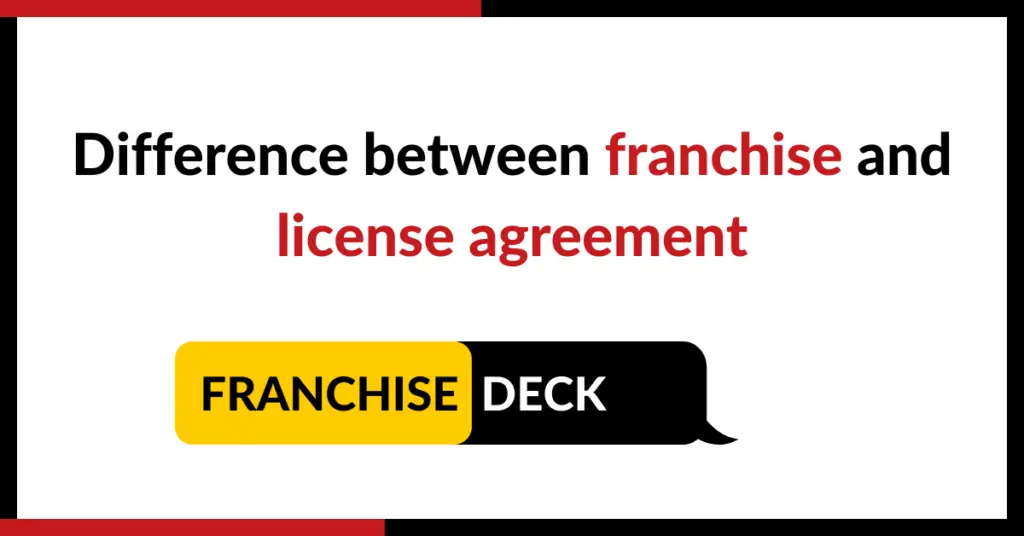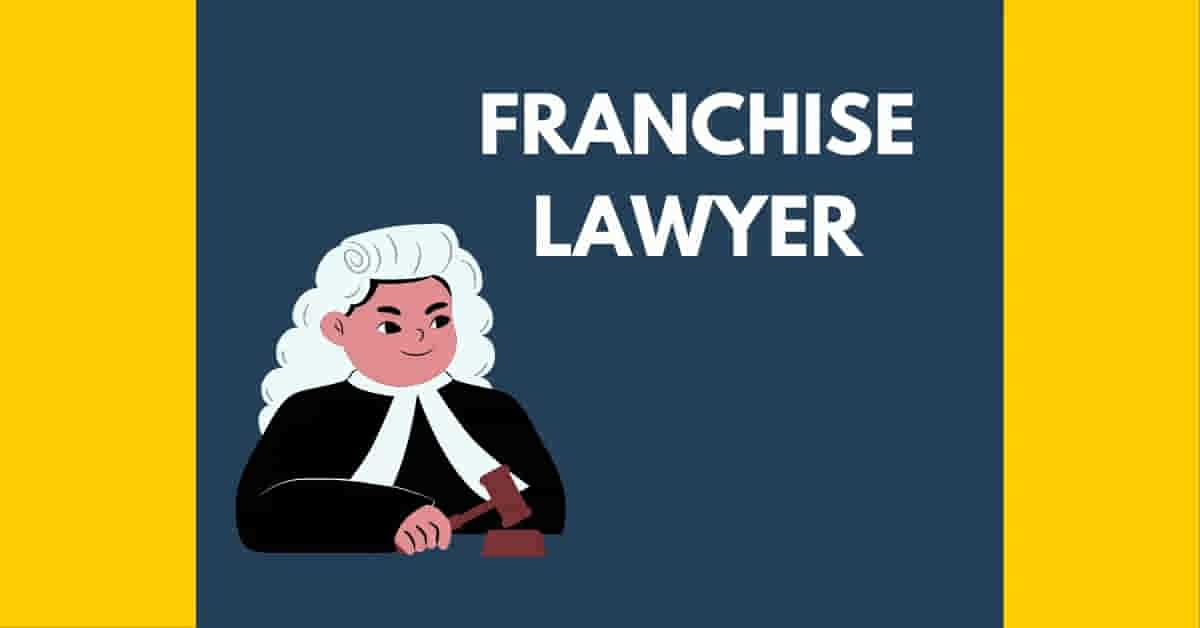You must have heard the terms franchising and licensing or listened to the conversation from your friends or colleagues about them. You will probably find it challenging to explain the difference between them, and we are here to help you find more on licensing agreement vs franchise.
There’s no easy way to explain the difference between franchising and licensing. Both concepts are similar in that they enable a business owner to expand their operations without building multiple units or partners.
Franchising is a business system that allows you to find the right franchise partner that suits your needs.
Franchising can be a great way to start a business, but it’s not suitable for everyone. Before you get too far into the process, ask yourself these questions to ensure the franchise world is right for you.
Why Do Some People Not Want to Franchise their Business?
Is Franchising Right For Me?
Franchising and licensing are two business models that have become popular to grow and scale businesses. Both can be effective, but they are not the same. Here is a guide to help you understand the differences between franchising vs licensing.
How does Licensing differ from a franchise?
Both franchising and licensing are methods of distributing products or services, while each one has its specific legal requirements and restrictions.
It can be challenging to determine which model is the right fit for your business. Therefore, we’ll look at some critical differences between licensing agreement and franchise.
When it comes to the franchising vs. licensing question, people often don’t realize the difference and (occasionally) confuse the two.
What is Franchising?
Franchising is when a business sells the rights to operate as one of its establishments to another individual/business. In other words, they get paid to do what they do best. Some think this will hinder your independence and autonomy, but it allows you to focus on the positives of running a business.
What is Licensing?
Anything relating to another person’s property is typically known as licensing for business. This process includes granting someone the use of your product for their business. To endure, you will need to closely examine their needs to show them why investing in this form of branding would likely benefit them.
Licensing the right product or service to the right company at the right time is the key to success in any business.
No matter what you do or what product or service you sell, a licensing opportunity lurks around the corner.

Franchise vs License
The two options have many similarities, but there are also significant differences.
In franchising, the owner typically buys into an established company and receives training, trade secrets, shared business infrastructure, and an established name.
It can lead to significant profits over a prolonged period when done correctly. However, it would be best to consider many aspects of franchising before diving headfirst into making this transition towards becoming a franchisee.
In licensing, someone who wants to enter a particular industry (for example, fast food) may have to get approval from all active brand owners in that sector first – after which they can start establishing a business without using the original name.
Managing a brick-and-mortar multi-location business can be challenging. Luckily, franchising uses an already established franchise operations system to manage day-to-day operations.
In licensing, someone who wants to enter a particular industry (for example, fast food) may have to get approval from all active brand owners in that sector first – after which they can start establishing a business without using the original name.

The decision to start a self-owned business, or franchising and licensing, can be difficult. However, there are several factors that you should consider before making a final choice.
License is solely about exchanging the rights for a product or idea for a set percentage of the profits; this requires close supervision – but does not require any initial investment.
A franchise business works similarly, rather than giving up part of your earnings. You are paying an initial fee to have your store, and this initial investment is usually more than licensing, but it will be worth it in the long term.
Determining whether franchising or licensing your business is the right approach for you can be a difficult choice. As an entrepreneur, you likely want to take advantage of the growth opportunities in business expansion.
Legalities of Franchising: Licensing Vs. Franchising
The United States of America has a variety of legal guidelines for franchising and licensing, and I shall discuss the most vital ones in this article; I’ll also speak about numerous different international locations. I’ve protected most of the areas and will not be talking about legal guidelines in Australia and Canada in this article since their legal guidelines are comparable to the United States.

Difference Between Franchise And License Agreement
The Franchise agreement has many terms and conditions that are different from the License agreement because of the nature of the business. The Franchise agreement has to comply with the law, while the License agreement is just a contract between the parties.
There are different terms in both, but they are not suitable for public use. The contract is constantly changing, and the terms are always changing. Various terms and conditions are used in the contract, depending on the type of industry.

Some of the terms and conditions are as follows:
1. Terms and conditions
Both the terms and conditions are different from each other.
If you are a franchisee, you have to pay a royalty fee.
But if you are a licensee, You will not pay a royalty fee but will get a particular share in the profits.
The main benefit of franchising is that the franchisees have to follow the strict guidelines that the franchisor follows.
2. Offer and acceptance
The Offer and Acceptance play a crucial role in the contract. It identifies the offer and acceptance.
The communication needs to be clear and direct. It must also have complete information about the contract, including specifications, price, delivery time, refund policies, etc.
3. Performance
Is there an obligation to perform the contract? The outcomes if the party fails to perform.
4. Payment Conditions
Is there a definite price list or other additional charges.
5. Delivery Conditions & On-Time delivery
What is the time frame for delivering the goods or services.This term confirms that the product is delivered on time and in the right place.
6. Warranties
Are there any warranties to cover mechanical defects or workmanship.
7. Product Sample
The product sample is the requirement to place the order. All the customer requires is a product sample with the price.
8. A Product Specification
Product Specification is the complete requirement of a product. Product specification tells the product size, product weight, product quality.
9. The Product Information & Description
It is the detail of the product. It gives a brief about the product.
The product description tells about the product details. Order example is a good quality product or a wrong quality product.
The Difference Between Franchising and Licensing with examples

Licensing has been a popular way to start up a new brand or product, especially for those with an already established name or fame, like Madonna, Martha Stewart, or the Pillsbury Doughboy. Your industry might have a similar, high-profile opportunity.
And even if you don’t, there are still many licensing opportunities for products, including athletic apparel, theme park, and amusement park products.
If we see franchising vs licensing example,
The franchise examples are ones we see daily like Mcdonald’s, Starbucks, Nike, and many more.
The license examples are Disney World, Manchester United, and many more.
A company can decide to select both business models in some cases. An example to explain this will be, Mcdonald’s already had hundreds of franchise stores worldwide. They can decide to license new t-shirts or mugs of their brand name.
In this manner, a brand can select both business strategies to grow their business.

How long is licensing agreement vs franchise?
A license agreement is a contract between a business and its customer. It is typically a legal document that sets out the terms and conditions under which the company will provide its services.
The license agreement includes the contract period, renewal options, and termination conditions. The licensing agreement term depends on the licensor and licensee and commonly starts with five years and one year of lock-in tems.
A franchise is a business model in which a business owner licenses their business to another individual or organization.
A franchise agreement is a contract between the business owner (franchisor) and the franchisee. Typically, the franchise agreement is for ten years. In some cases, it’s either for five years or can be for 20 years.
Conclusion
Franchising and licensing are both viable ways to grow your business. Learn the pros and cons of each and see which one is best for your business.
If you’re considering starting a business, you’ve probably considered one of these two options. Franchising and licensing are business models you can use to get a new business off the ground.
Still, they’re very different in the amount of work involved, the amount of money required, and the level of control over the business.
Leave your comment below,what you prefer between licensing agreement vs franchise.





I was so confused in franchising and licensing, but after reading this article its all done.
A licensing agreement is a type of contract that allows one party to grant another party permission to use their intellectual property in exchange for payment.
A franchise is a type of business arrangement where the franchisor grants the franchisee the right to use their trademark, logo and business systems in exchange for a fee. Licensing agreements are typically used to grant permission to use a company’s patent, copyright, trademark, or trade secret. great blog franchise deck
A licensing agreement is when a company grants another company the right to use its intellectual property or brand name in exchange for a fee. A franchise agreement is a contract between a franchisor and a franchisee that defines the rights and obligations of each party in relation to a business venture.
Licensing agreements are typically used to grant a company access to patented technology, trademarks or copyrights. Franchise agreements are generally used to provide a business opportunity to a potential franchisee, who will then operate their own business. Licensing agreements are usually limited in scope, with the licensee only being able to use the intellectual property for a specific purpose and for a certain period of time.
Franchise agreements are usually more comprehensive and include detailed information about the franchisor’s business model, training, marketing, and other operational matters. Licensing agreements are typically non-exclusive, meaning that the licensor can grant multiple licenses to different parties. Franchise agreements are usually exclusive, meaning that the franchisor can only grant the rights to operate a business to one party. Licensing agreements usually involve the payment of a one-time fee, while franchise agreements usually involve the payment of an upfront fee and ongoing royalties. Both licensing agreements and franchise agreements involve the transfer of intellectual property rights, however, a franchise agreement also involves the transfer of operational know-how.
Licensing agreements are typically simpler to draft and execute, while franchise agreements require more detailed negotiations. Licensing agreements are primarily used for the protection of intellectual property rights, while franchise agreements are primarily used for business expansion. Licensing agreements are typically governed by copyright laws, while franchise agreements are usually governed by contract law. Licensing agreements generally do not involve any direct involvement of the licensor in the licensee’s business, while franchise agreements usually involve a more hands-on approach from the franchisor. Licensing agreements are often used to monetize intellectual property, while franchise agreements are used to create a business that can be replicated and scaled.